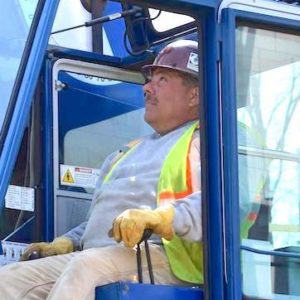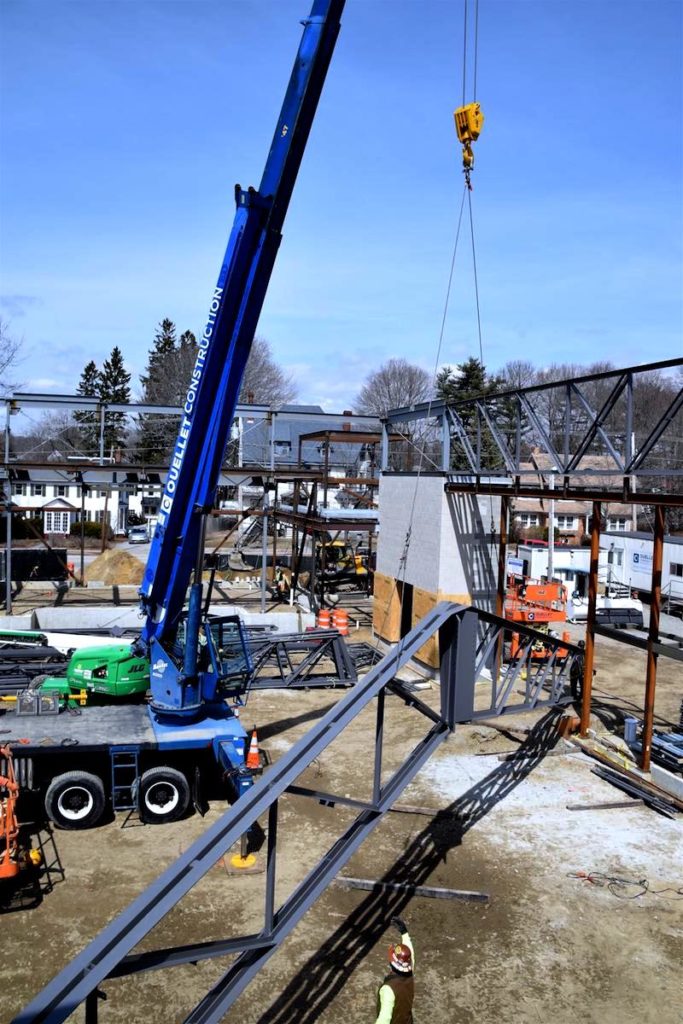NCCCO Crane Operation Certification.
Three Ouellet Construction Associates Undergo Extensive Testing for NCCCO Mobile Crane Operation Certification
Ouellet Construction is dedicated to providing our associates with the resources and training required to do their jobs well – and safely – which includes assisting them in maintaining the latest certification requirements as they arise. Most recently, three members of the Ouellet Construction acquired mobile crane operation certification in TSS (Fixed Cab) and TLL (Swing Cab) cranes through the National Commission for the Certification of Crane Operators (NCCCO).
Certified Member Profiles
The newly certified members of the Ouellet team include Dean and Don Ouellet, and Russell Suchar.
Dean Ouellet, Vice President of Operations/Project Superintendent (LEED Green Associate)
Dean knew from a young age that he wanted to join the family construction business and worked his way from observing job sites to managing the full scope of the job. His straightforward manner and foresight in planning pave the way for clear and collaborative negotiations, while his organizational savvy and quick on-site decision-making result in projects that are ahead of schedule and under budget.
Don Ouellet, Project Superintendent
Don was a Master Mason before he graduated high school and he knew that he wanted to bring this skill to the family business when he joined Ouellet Construction in 1986. His technical proficiency in masonry and concrete naturally evolved into total project planning as he mastered a wide range of construction capabilities required for a diverse set of projects.
Russell Suchar, Tractor Trailer Operator/Carpenter (Class A Truck Driver)
Russell has been an integral part of the Ouellet Construction field team for more than 15 years and has been a key member in a variety of successful projects during that time. He is a skilled tradesman in concrete and carpentry, and his attention to detail and regard for safety are what made him the perfect candidate for operating our tractor-trailer to haul our heavy equipment and resources to our sites.
Mobile Crane Uses and Types
There are several types of cranes used in construction, and a crane’s use can vary greatly depending on the type of crane you are using. Throughout the construction industry, various types of cranes are used to hoist up large structural components of a building. For example, it is common to use cranes to host steel or pre-cast concrete. They can also be used to hoist large equipment, such as air handlers, generators, etc., onto roofs or high floors of buildings.
Fixed Cab vs. Swing Cab Mobile Cranes
There are four main types of cranes, which are often combined to create a combination of features to meet the needs of crane operators. The four crane types include:
- Hydraulic Boom Crane: Allows the operator to move boom up and down, as well as to extend and retract.
- Lattice Boom Crane: Allows the operator to extend and retract boom.
- Fixed Cab Crane: Has a stationary cab, allowing the operator to see only what’s in front of him/her or to the side.
- Swing Cab Crane: Has a movable cab, allowing the operator to get a 360-degree view by maneuvering the cab in any direction necessary.
Our Hydraulic Boom Truck
At Ouellet Construction we use our 30-ton hydraulic boom truck crane for a variety of reasons, but its main purpose is to erect steel. We also use the crane to transport material and equipment to roofs and tall structures.
Because the types of jobs we do require the use of a highly maneuverable piece of equipment, we use a swing cab hydraulic boom truck due to its ability to raise up and down, extend and retract, as well as move left to right.
Mobile Crane Operation Certification Testing Process and Requirements
The NCCCO mobile crane operator testing process is a highly specific and in-depth training and examination program. It is meant for experienced crane operators to further their expertise.
Eligibility
The following parameters describe the ideal candidate for certification:
- Must be a trained crane operator currently working in crane operation
- Must be willing continue to meet ASME B30 physical requirements throughout the certification period (May require a current Department of Transportation (DOT) Medical Examiner’s Certificate)
The mobile crane operator certification process consists of both written and practical examinations.
Written Examinations
The Written Examination includes a core examination in crane operation, as well as at least one – and up to four – crane specialty examinations. The core examination is lengthy, consisting of 90 multiple-choice questions. Each specialty examination includes 26 multiple-choice questions.
Specialty examinations include:
- Lattice Boom Crawler Cranes (LBC)
- Lattice Boom Truck Cranes (LBT)
- Telescopic Boom Cranes—Swing Cab (TLL)
- Telescopic Boom Cranes—Fixed Cab (TSS)
Practical Examinations
The Practical Examination(s) allows candidates to demonstrate crane operation proficiency in the field. There are three crane types to choose from for the practical examination:
- Lattice Boom Cranes
- Telescopic Boom Cranes – Swing Cab (TLL)
- Telescopic Boom Cranes – Fixed Cab (TSS)
Certification Requirements
According to the NCCCO, the requirements for achieving NCCCO Mobile Crane Operator Certification include:
- Must be at least 18 years of age
- Must meet medical requirements
- Must comply with NCCCO’s Substance Abuse Policy
- Must Pass Written Examinations
- Must Pass Practical Examination(s) (Must also pass the practical exam within twelve months of passing the written examination)
- Must comply with the NCCCO Code of Ethics
Candidates must pass the following to achieve NCCCO Mobile Crane Operation Certification for a five-year period:
- Written Core Examination
- At least one Written Specialty Examination
- The corresponding Practical Exam(s)
The Recertification Process
Certification is valid for five years. 12 months before certification expiration, candidates must complete all recertification requirements, which at a minimum, include:
- Core Examination in crane operation
- Up to four Specialty Examinations
Candidates who have performed at least 1,000 hours of crane-related experience (operation, maintenance, inspection, training) during their period of certification are not required to pass a Practical Exam to become recertified. All others must take the Practice Exam for recertification. For additional information regarding the recertification process, certification lapses failed recertification attempts, and more, visit NCCCO.org.
Congratulations to Dean, Don, and Russell!
We take much pride in our associates’ achievements and congratulate them on a job well done! We appreciate the time and effort they each put towards achieving their crane operation certifications, and we look forward to utilizing their enhanced skill sets on upcoming projects.
Do you have a construction project requiring a certified mobile crane operator? Ouellet Construction has the equipment and expertise to get the job done.



